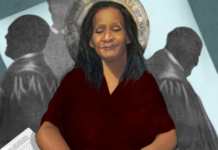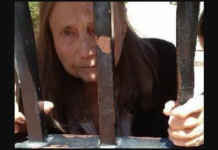EDITOR’S CORNER
Elderly man falls, hits head, goes to hospital with severe concussion. His memory is fuzzy. By the time this daughter finds out, he’s at assisted living. She wants to bring him home.
But, no. A woman explains she’s been appointed by a probate court as his guardian. He can’t go home with his daughter, she says. He can’t leave the facility. He can’t do anything without the guardian’s permission. He can’t make his own healthcare decisions. He can’t spend his own money. His daughter does her best to fight the system and free her dad, but meanwhile, he gets put on more and more drugs.
That’s the basic plot for “The Bad Guardian,” a new film now streaming on Lifetime that aims to encapsulate all that can go wrong with guardianship — a system that strips individuals of their money, their rights, their freedom to make any decisions affecting any corner of their life.
 Here on Mad in The Family and Mad in America, none of this is surprising. We’ve read first-person accounts by family members recounting such nightmare scenarios — including Marian Kornicki’s story from 2022 and Poppy Helgren’s from December of last year. Most recently, Duane Farrant described losing his mother to conservatorship and all the horrors that followed. And former MITF editor Miranda Spencer has written extensively about Britney Spears and the #FreeBritney movement that rallied for her release.
Here on Mad in The Family and Mad in America, none of this is surprising. We’ve read first-person accounts by family members recounting such nightmare scenarios — including Marian Kornicki’s story from 2022 and Poppy Helgren’s from December of last year. Most recently, Duane Farrant described losing his mother to conservatorship and all the horrors that followed. And former MITF editor Miranda Spencer has written extensively about Britney Spears and the #FreeBritney movement that rallied for her release.
Spears, who was freed from conservatorship in November 2021, has received the most attention in mainstream coverage of such issues, although other celebrities occasionally bubble up into the public consciousness. But by and large, besides the #FreeBritney campaign, most people outside the MIA/MITF community have barely an inkling of the outrages that can occur under guardianship and conservatorship.
To be clear, not all guardians are abusive; as author Diane Dimond explained in We’re Here To Help: When Guardianship Goes Wrong, family members often fill the role with loving responsibility. But as she made clear in both the book and in my MIA podcast interview with her last year, others exploit and abuse those in their care. As she said during our conversation:
“Every year in this country, state courts hear guardianship cases. The targeted person is declared an incapacitated ward of the court. They are stripped of their civil rights. In most states, the vast majority of states, they can’t even hire a lawyer to defend themselves because they’re incapacitated. These state courts then confiscate the money, property, investments of all the wards and put it in the name of the guardian. . . . It’s just a playground for predators. That is what it’s become.”
And that, in essence, is the message of “The Bad Guardian,” which was inspired not by one specific story but by the experiences of countless people. Playing the daughter, Melissa Joan Hart embodies the bafflement and frustration of those who, trying to advocate for their loved ones, bump up against a system purportedly designed to aid people but routinely dehumanizes and hurts them.
As executive producer Elizabeth Stephens told an investigative reporter at a ABC Action News in Tampa Bay: “Every single turn of events is true. It’s all real. And, you know, it’s shocking. . . . What happens is they get into the system, and then, as you know, it’s almost impossible to get out.”
That could well be the biggest horror of all — the legal cage that traps the vulnerable. In his recent piece for MITF, Farrant unspooled a gut-wrenching story of his “stolen” mother’s own cage. While trapped inside the system, she lost her health. Her teeth. Her ability to make any decisions. Her liberty in every sense. And he could not get her out.
“People in this system of ‘care’ lied, cheated, and stole, ignoring my mother’s health, desires, and well-being until it killed her,” he wrote. “This is what happens—not just to her, but to many.”
Far too many.
—Amy Biancolli, Family Editor
***
More from Mad in the Family
More Editor’s Corners















Our mother and father lived in Wakulla County for over 20 years. In 2019 our father was diagnosed with Dementia. Unbeknownst to his family, in November 2019 he was put into an illegitimate covert guardianship by a local doctor/politician, his wife and an attorney. Our father was severely isolated for three years, moved four times, he was lied to repeatedly, his estate papers radically changed, and the estate liquidated. Sadly, he passed away in guardianship. The family was notified of his death two months after his passing, through the same court we had been fighting to release him. We fought to honor his end-of-life wishes, expressed to his family long before his mental decline that he adamantly wanted to stay in his home until his death with his animals and be free to engage in his horticulture projects.
The team of elder “professionals” that manipulated him and took advantage of him involved a Tallahassee attorney, Twyla Sketchley and two others she works with, Dr. Howard Kessler and his wife Anne Van Meter. Van Meter became dad’s Guardian and Trustee of the estate, and her husband became dad’s Health Surrogate.
Unfortunately, we are still fighting in court for what little remains of the estate. They have petitioned the court for exorbitant fees with evidence of double and triple billing. All the judges we have encountered in this battle to rescue our father have always ruled in their favor, openly and obviously biased. Laws were broken, mistakes made and lies were told in court by the attorneys, but the judges ignored it and gave a pass to the predatory elder professionals repeatedly. A long series of hearings entailed over endless legal trivialities which only served to enrich the court and all the plethora of lawyers involved while confusing and hiding the real issues at stake.
Even though we have gone through this dreadful and expensive nightmare, I still find it hard to believe that these attorneys and other so-called, “elder transition experts” who are also involved in assisting the predators are getting away with this. They successfully kept an elderly man away from his family in the last years and days of his life. How cruel is that? They kept us all from visiting, saying goodbye, and mourning his death. They had no regard for the lifetime relationship and bonds his children and grandchildren had with him. They robbed our parents’ estate like they were entitled and the rightful heirs a target for false accusations and harassment. I was accused of grand theft of my parents’ vehicles. Vehicles I did not have in my possession. They had them.
Before this, I believed in the judicial process was a fair legal system; but since my family has endured this heartbreak, no more. We have experienced a rigged system where elders are easily taken away from their loved ones, abused and robbed. Not only do the legal elites and insiders get away with it, but they also have no conscience about abiding by the law of the land and no motivation to improve a system that covers and enables their injustice.
Update: Still fighting in the guardianship court, Kessler was never the health care surrogate, he frauded the court and health care agencies as well did other players in this case. Recently filed a RICO case in the northern district of Florida
Thank you,
Geralyn Lambou
cell: 323.707.5741
Report comment